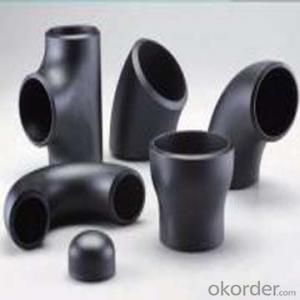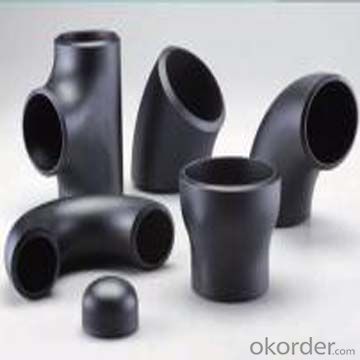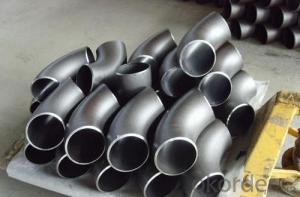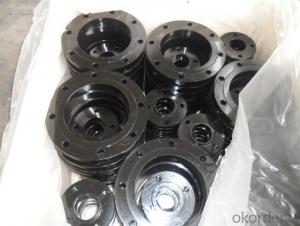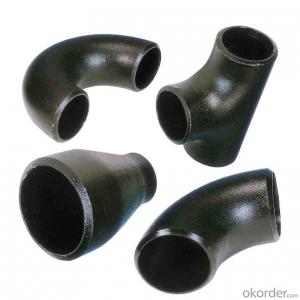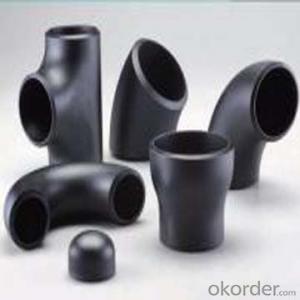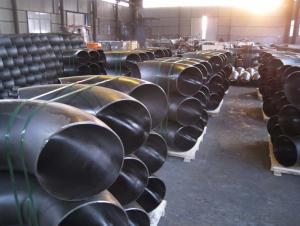CARBON STEEL PIPE FITTINGS ASTM A234 TEE BEND FANGE
- Loading Port:
- Tianjin
- Payment Terms:
- TT OR LC
- Min Order Qty:
- 1 m.t.
- Supply Capability:
- 30000 m.t./month
OKorder Service Pledge
OKorder Financial Service
You Might Also Like
Specifications
1.we produce seamless steel pipe
2.size:48-219*4.5-45mm
3.ISO 9000 approved
4.Market:south/east Asia,Mid-east,South America
seamless steel pipe
Material J55 K55 N80 L80 P110.etc
Standard ASTM JIS
Usage conveying oil gas ,oil pipe line,pipe material collar,oil nature gas,
Packing wooden cases or wooden pallet ,export standard package
Others:Special design available according to requirement
Anti-corrosion available and high temperature resistence
Delivery time 30days
Payment term T/T L/C
Name | API oil casing pipe | ||||
Out Diameter | Wall thickness | Material | Thread | Length | |
in | mm | ||||
5 1/2 | 139.7mm | 6.20 | J55/K55/N80 | LTC/STC/BTC | R2 |
6.98 | |||||
7.72 | |||||
9.17 | |||||
10.54 | |||||
6 5/8 | 168.28mm | 7.32 | J55/K55/N80 | LTC/STC/BTC | R2 |
8.94 | |||||
10.59 | |||||
12.06 | |||||
12.06 | |||||
8 5/8 | 219.08 | 8.94 | H40 | S/L/B | 9 5/8R2 |
J55/K55 | S/L/B | ||||
10.6 | L80 | L/B | |||
12.7 | L80 C95 | L/B | |||
14.15 | P110 | L/B | |||
9 5/8 | 244.48 | 13.84 | J55 K55 | R2 | |
15.11 | L80 | L/B | |||
10 3/4 | 273.05 | 11.43 | J55 K55 | S/B/E | R2 |
13.84 | P110 | S/B | |||
15.11 | P110 | S/B | |||
11 3/4 | 298.45 | 12.19 | J55 K55 | S/B | R2 |
10.96 | J55 K55 | S/B | |||
13 3/8 | 339.72 | 12.19 | J55 K55 L80 | S/B | R2 |
10.92 | J55 K55 | S/B | |||
13.06 | L80 | S/B | |||
Coupling and thread can be required according to customer requirment
- Q: How are steel pipes used in the construction of wastewater treatment plants?
- Steel pipes are used extensively in the construction of wastewater treatment plants for various purposes. They are used for the transportation of wastewater from one unit to another, as well as for the distribution of treated water to different areas. Steel pipes are also used in the construction of the main water supply and drainage systems within the plants. Additionally, they are utilized for the installation of pumps, valves, and other equipment required for the treatment process. The durability and strength of steel pipes make them an ideal choice for the demanding and corrosive environment of wastewater treatment plants.
- Q: Are steel pipes suitable for wastewater treatment facilities?
- Yes, steel pipes are suitable for wastewater treatment facilities. Steel pipes are commonly used in these facilities due to their high strength, durability, and resistance to corrosion. Wastewater treatment facilities typically handle corrosive and abrasive materials, and steel pipes are able to withstand these harsh conditions. Additionally, steel pipes are available in various sizes and configurations, allowing for easy installation and customization to meet the specific needs of the facility. Furthermore, steel pipes can be easily repaired or replaced if necessary, ensuring the longevity and reliability of the wastewater treatment system. Overall, steel pipes are a suitable choice for wastewater treatment facilities due to their strength, durability, corrosion resistance, and flexibility in installation and maintenance.
- Q: Can steel pipes be used for underground telecommunications networks?
- Yes, steel pipes can be used for underground telecommunications networks. Steel pipes are commonly used for their durability, strength, and resistance to corrosion, making them suitable for protecting and housing telecommunication cables underground. They provide reliable protection against external elements and mechanical damage, ensuring the smooth operation of underground telecommunications networks.
- Q: What are the advantages of using steel pipes in construction projects?
- Using steel pipes in construction projects offers numerous benefits. Firstly, the strength and durability of steel pipes are remarkable. With a high tensile strength, they can withstand heavy loads and pressures without any deformation or breakage. This makes them ideal for projects that require structural integrity, such as building construction, bridge building, and infrastructure development. Secondly, steel pipes exhibit exceptional resistance to corrosion. They are typically coated with protective layers, like galvanized zinc or epoxy, which prevent rusting and extend their lifespan. Consequently, steel pipes are suitable for both aboveground and underground applications, including water and sewage systems, oil and gas pipelines, and industrial processing plants. Furthermore, steel pipes offer great versatility in terms of shape and size. They can be manufactured in various diameters and thicknesses, allowing for customization to meet specific project requirements. This flexibility in design makes steel pipes suitable for a wide range of applications in construction, including plumbing, HVAC systems, and structural supports. Moreover, steel pipes are relatively easy to install and maintain. They can be welded, threaded, or bolted together, providing a secure and leak-proof connection. This ease of installation reduces construction time and labor costs. Additionally, steel pipes require minimal maintenance, as they are resistant to cracking, chipping, and warping. This makes them a cost-effective choice over the long term. Lastly, steel pipes are environmentally friendly. They are 100% recyclable, meaning they can be reused and repurposed without compromising their structural integrity. By recycling steel pipes, the demand for new raw materials is reduced, and waste generation is minimized. Therefore, steel pipes are a sustainable option for construction projects. In summary, the advantages of using steel pipes in construction projects encompass their strength, corrosion resistance, versatility, ease of installation and maintenance, and environmental sustainability. These attributes make steel pipes a reliable and cost-effective choice for a wide range of applications in the construction industry.
- Q: What is the single length of galvanized steel pipe?
- The single length of galvanized pipe is 6 meters. The length of galvanized seamless steel tube is uncertain. It depends on the length of seamless steel tube
- Q: How are steel pipes used in plumbing?
- Steel pipes are commonly used in plumbing for various applications such as water supply and drainage systems. They provide durability, strength, and resistance to corrosion, making them suitable for both residential and industrial plumbing. Steel pipes can be used for transporting water, gases, and other fluids, and are often connected with fittings and valves to create a reliable and efficient plumbing system.
- Q: How are steel pipes used in the agriculture industry?
- Steel pipes are widely used in the agriculture industry for various purposes such as irrigation systems, water supply networks, and drainage systems. They are used to transport water for crop irrigation, allowing for efficient and controlled distribution. Steel pipes are also utilized in the construction of farm buildings and structures, providing support and durability. Additionally, they are commonly used in the creation of livestock handling equipment, such as pens and fences. Overall, steel pipes play a crucial role in enhancing productivity and efficiency within the agriculture industry.
- Q: What are the different types of steel pipe fittings for gas pipelines?
- There are several types of steel pipe fittings commonly used for gas pipelines, including elbows, tees, reducers, flanges, and couplings. Elbows are used to change the direction of the pipeline, while tees are used to create branch connections. Reducers are used to connect pipes of different sizes, and flanges are used for connecting pipes with valves or other equipment. Couplings are used to join two pipes together.
- Q: Are steel pipes suitable for underground sewage systems?
- Yes, steel pipes are suitable for underground sewage systems. Steel pipes are known for their strength, durability, and resistance to corrosion, making them an ideal choice for underground installations. Steel pipes can withstand the pressure and weight of the soil above, ensuring the integrity of the sewage system. Additionally, steel pipes have a long lifespan and can withstand extreme temperatures and environmental conditions, making them a reliable choice for underground applications. However, it is important to note that proper coating and insulation should be applied to steel pipes to prevent corrosion and ensure longevity.
- Q: What are the different surface finishes available for steel pipes?
- Some common surface finishes available for steel pipes include black or bare (uncoated) finish, galvanized finish, and coated finishes such as epoxy, polyethylene, or polypropylene. These finishes provide varying levels of protection against corrosion and can be chosen based on the specific application and environmental conditions.
Send your message to us
CARBON STEEL PIPE FITTINGS ASTM A234 TEE BEND FANGE
- Loading Port:
- Tianjin
- Payment Terms:
- TT OR LC
- Min Order Qty:
- 1 m.t.
- Supply Capability:
- 30000 m.t./month
OKorder Service Pledge
OKorder Financial Service
Similar products
Hot products
Hot Searches
Related keywords
